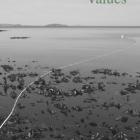Kirkman, Robert. “Darwinian Humanism and the End of Nature.” Environmental Values 18, no. 2 (2009): 217–36. doi: 10.3197/096327109X438071. Republished by the Environment & Society Portal, Multimedia Library. http://www.environmentandsociety.org/node/7499.
Darwinian humanism proposes that environmental philosophers pursue their work in full recognition of an irreducible ambiguity at the heart of human experience: we may legitimately regard moral action as fully free and fully natural at the same time, since neither perspective can be taken as the whole truth. A serious objection to this proposal holds that freedom and nature may be unified as an organic whole, and their unity posited as a matter of substantive truth, by appeal to teleology. In particular, I consider Hegel’s account of the emergence of Absolute Spirit, weigh its advantages and disadvantages as an approach to human moral experience and as a strategic move for environmentalists, and conclude with a refinement of Darwinian humanism and a clarification of its implications for environmental ethics.
— Text from The White Horse Press website
All rights reserved. © 2009 The White Horse Press


